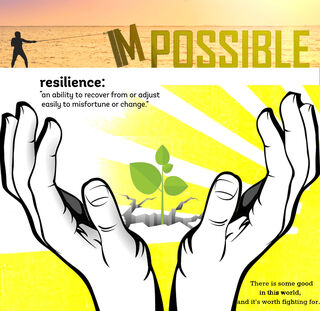Resilience
Resilience: How It Can Help Improve Your Mental Health
Learn five ways to develop a path towards a more resilient lifestyle.
Posted October 15, 2020 Reviewed by Kaja Perina
Over the past three months, I’ve published a blog series H.E.A.R. (Hope Empowerment, Adaption, Resilience). I selected these four skills because I felt they could help people cope with the unprecedented challenges we’re enduring in these chaotic times and offer a path forward in our mental health development. I’m wrapping up the series with the final and critical skill: Resilience.
I talk frequently about resilience because it's a key building block that enables you to rebound from adversity and the unknown without crippling fear. Resilient people bounce back from challenges with a renewed sense of strength and purpose. They feel empowered to use their emotional resources to work through troubling times. They have self-confidence in their ability to get to the other side without collapsing under the pressure.
A survey conducted by Everyday Health, with The Ohio State University, found that 83% of Americans believed they had high levels of emotional and mental resilience. However, only 57% scored as resilient on the “Everyday Health Assessment of Resilience.” Alarmingly, a European study “Psychological resilience: A review and critique of definitions, concepts, and theory,” showed that patients who had attempted suicide had significantly lowered resilience scale scores than patients who had never attempted suicide (Fletcher, D., & Sarkar, M., 2013).
Research shows resilience can assist people in coping with several mental health issues such as post-traumatic stress (PTS), cancer diagnoses, and rheumatoid arthritis. It helps people develop positive mental health outcomes caused by stressful situations at home, work, and in acute environments like the global pandemic. Children need to develop resilience, too. For that reason, pediatrician, Dr. Ken Ginsburg suggested that children should learn the 7C’s Resilience Model to help them learn and build resilience from an early age.
I’ve identified five ways that I have used effectively to help my clients learn to develop a path towards a more resilient lifestyle. These are methods you can master if you stay committed and coalesce them together.
1. Self-Awareness
Part of becoming more self-aware is planning realistically. This allows you to focus on your strengths in goal planning. Be honest with yourself about your strengths and your weaknesses. Setting goals helps build confidence and self-esteem. It can also help to curb feelings of hopelessness and despair.
Self-awareness will help you handle adversity. Figure out what adaptive strategies you can use to abate any fight-or-flight response you experience when things go awry.
2. Coping Skills
The better you are at coping, the better able you will be to handle setbacks. Strong coping skills include reframing your thoughts, stopping thinking errors, identifying creative solutions, and increasing your internal locus of control. An Internal locus of control yields a powerful feeling of competence and confidence that makes you more resilient. You will feel more capable of managing and problem-solving stressful situations. You will feel you are living life, and life isn’t living you.
3. Optimism
Optimists feel more in control of the outcomes of their decisions. To build optimism, focus on what “you” can do and not what is reliant on anyone else. Adapting quickly, both emotionally and physically, takes the form of both emotional adaptation to problem situations and physiological adaptation (fight-or-flight response) to issues you may face. To become a resilient optimist, you must believe you can handle challenges as they arise.
I’m sure you’ve heard the term “keeping a cool head.” Easier said, then done, right? Reining in your moods is empowering and a confidence booster. You can do this by employing emotion regulation methods, such as guided imagery, meditation, and mindfulness. Take a few minutes to note your time and place in space using objects or details about you while breathing into your body. Make sure your mood and the event are consistent with each other so you’re not catastrophizing. Using a thought-stopping rubber band to thwart thinking errors is an example of an effective mood regulation strategy.
5. Communication
Being able to communicate honestly is necessary to become resilient. Don’t be defensive and or let your ego get in the way. Both will hinder your ability to cope emotionally with an issue and move on. Use your family and friends, they can help provide a sense of security and comfort during troubling times. You can't develop resilience alone on an island.

Resilience is necessary for you to be successful on a path toward improved emotional health. I encourage you to try the H.E.A.R. techniques: Hope, Empowerment, Adaptation, and Resilience. They will help you find a path towards improved mental health and sustained satisfaction in your everyday life.
"The greatest glory in living lies not in never falling, but in rising every time we fall."
— Nelson Mandela




